气温骤降,最近几天都在下雨,天气软件弹出的VIP弹窗很有意思,于是便想把它分析下。
本文仅限学习交流使用,如有侵权联系删除
工具 ida frida Android12 so=>arm64-v8a
1.页面展示
分析的是这个页面下的sign
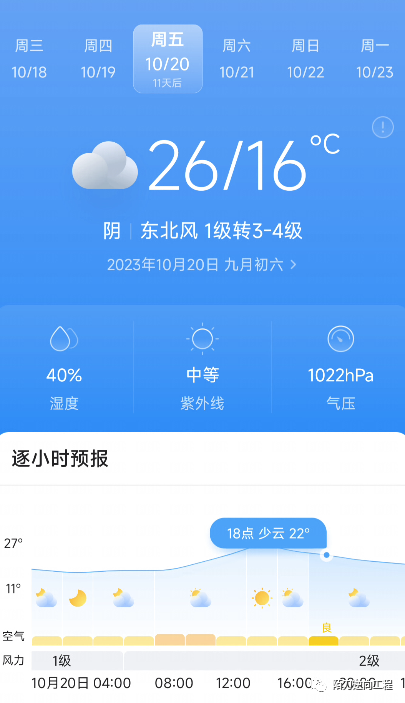
定位函数入口,先直接找到动态注册的函数,然后hook一下

function Digest() {
Java.perform(function () {
let Digest = Java.use("com.moji.mjweather.library.Digest");
Digest["nativeEncodeParams"].implementation = function (str) {
console.log(`Digest.nativeEncodeParams is called: str=${str}`);
let result = this["nativeEncodeParams"](str);
console.log(`Digest.nativeEncodeParams result=${result}`);
console.log(Java.use("android.util.Log").getStackTraceString(Java.use("java.lang.Exception").$new()));
return result;
};
});
}结果如下,这次就不猜它是啥加密了,去0x3d1a0一步步看

2.函数分析
在0x3d1a0这里看到一个熟悉的操作,很多hash函数都会有这个操作
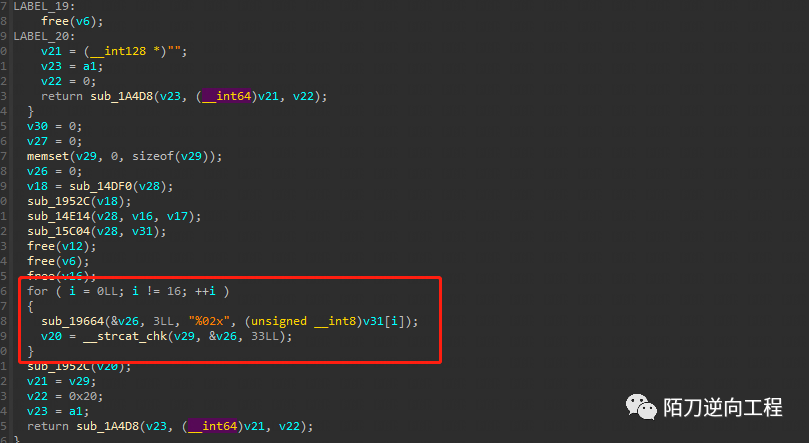
用ida自带的插件signsrch看一下
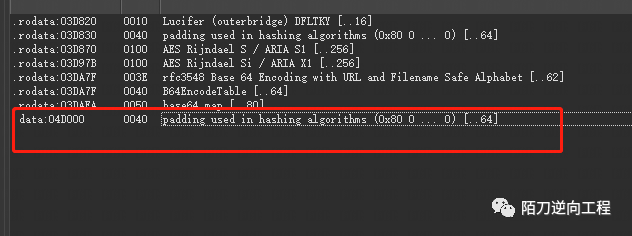
往上追就是0x15c04
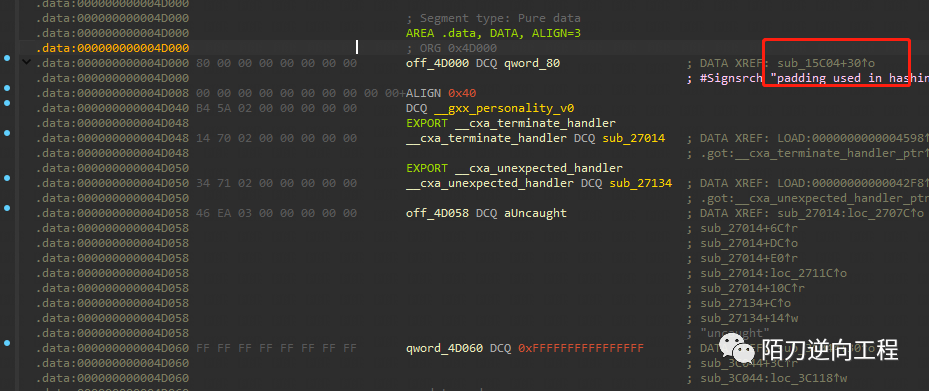
到了这里那就看一下md5的实现函数
#include <stdio.h>
#include <string.h>
typedef unsigned char *POINTER;
typedef struct {
unsigned int state[4];
unsigned int count[2];
unsigned char buffer[64];
} MD5_CTX;
void MD5Init(MD5_CTX *);
void MD5Update(MD5_CTX *, unsigned char *, unsigned int);
void MD5Final(unsigned char[16], MD5_CTX *);
void MD5Transform(unsigned int[4], unsigned char[64]);
void Encode(unsigned char *, unsigned int *, unsigned int);
void Decode(unsigned int *, unsigned char *, unsigned int);
#define S11 7
#define S12 12
#define S13 17
#define S14 22
#define S21 5
#define S22 9
#define S23 14
#define S24 20
#define S31 4
#define S32 11
#define S33 16
#define S34 23
#define S41 6
#define S42 10
#define S43 15
#define S44 21
unsigned char PADDING[64] = {
0x80, 0, 0, 0, 0, 0, 0, 0, 0, 0, 0, 0, 0, 0, 0, 0,
0, 0, 0, 0, 0, 0, 0, 0, 0, 0, 0, 0, 0, 0, 0, 0,
0, 0, 0, 0, 0, 0, 0, 0, 0, 0, 0, 0, 0, 0, 0, 0,
0, 0, 0, 0, 0, 0, 0, 0, 0, 0, 0, 0, 0, 0, 0, 0
};
#define F(x, y, z) (((x) & (y)) | ((~x) & (z)))
#define G(x, y, z) (((x) & (z)) | ((y) & (~z)))
#define H(x, y, z) ((x) ^ (y) ^ (z))
#define I(x, y, z) ((y) ^ ((x) | (~z)))
#define ROTATE_LEFT(x, n) (((x) << (n)) | ((x) >> (32 - (n))))
#define FF(a, b, c, d, x, s, ac) \
{ \
(a) += F((b), (c), (d)) + (x) + (unsigned int)(ac); \
(a) = ROTATE_LEFT((a), (s)); \
(a) += (b); \
}
#define GG(a, b, c, d, x, s, ac) \
{ \
(a) += G((b), (c), (d)) + (x) + (unsigned int)(ac); \
(a) = ROTATE_LEFT((a), (s)); \
(a) += (b); \
}
#define HH(a, b, c, d, x, s, ac) \
{ \
(a) += H((b), (c), (d)) + (x) + (unsigned int)(ac); \
(a) = ROTATE_LEFT((a), (s)); \
(a) += (b); \
}
#define II(a, b, c, d, x, s, ac) \
{ \
(a) += I((b), (c), (d)) + (x) + (unsigned int)(ac); \
(a) = ROTATE_LEFT((a), (s)); \
(a) += (b); \
}
void MD5Init(MD5_CTX *context)
{
context->count[0] = context->count[1] = 0;
context->state[0] = 0x67452301;
context->state[1] = 0xefcdab89;
context->state[2] = 0x98badcfe;
context->state[3] = 0x10325476;
}
void MD5Update(MD5_CTX *context, unsigned char *input, unsigned int inputLen)
{
unsigned int i, index, partLen;
index = (unsigned int)((context->count[0] >> 3) & 0x3F);
if ((context->count[0] += ((unsigned int)inputLen << 3)) < ((unsigned int)inputLen << 3))
context->count[1]++;
context->count[1] += ((unsigned int)inputLen >> 29);
partLen = 64 - index;
if (inputLen >= partLen) {
memcpy(&context->buffer[index], input, partLen);
MD5Transform(context->state, context->buffer);
for (i = partLen; i + 63 < inputLen; i += 64) {
MD5Transform(context->state, &input[i]);
}
index = 0;
} else {
i = 0;
}
memcpy(&context->buffer[index], &input[i], inputLen - i);
}
void MD5Final(unsigned char digest[16], MD5_CTX *context)
{
unsigned char bits[8];
unsigned int index, padLen;
Encode(bits, context->count, 8);
index = (unsigned int)((context->count[0] >> 3) & 0x3f);
padLen = (index < 56) ? (56 - index) : (120 - index);
MD5Update(context, PADDING, padLen);
MD5Update(context, bits, 8);
Encode(digest, context->state, 16);
memset(context, 0, sizeof(*context));
}
void MD5Transform(unsigned int state[4], unsigned char block[64])
{
unsigned int a = state[0], b = state[1], c = state[2], d = state[3], x[16];
Decode(x, block, 64);
FF(a, b, c, d, x[0], S11, 0xd76aa478);
FF(d, a, b, c, x[1], S12, 0xe8c7b756);
FF(c, d, a, b, x[2], S13, 0x242070db);
FF(b, c, d, a, x[3], S14, 0xc1bdceee);
FF(a, b, c, d, x[4], S11, 0xf57c0faf);
FF(d, a, b, c, x[5], S12, 0x4787c62a);
FF(c, d, a, b, x[6], S13, 0xa8304613);
FF(b, c, d, a, x[7], S14, 0xfd469501);
FF(a, b, c, d, x[8], S11, 0x698098d8);
FF(d, a, b, c, x[9], S12, 0x8b44f7af);
FF(c, d, a, b, x[10], S13, 0xffff5bb1);
FF(b, c, d, a, x[11], S14, 0x895cd7be);
FF(a, b, c, d, x[12], S11, 0x6b901122);
FF(d, a, b, c, x[13], S12, 0xfd987193);
FF(c, d, a, b, x[14], S13, 0xa679438e);
FF(b, c, d, a, x[15], S14, 0x49b40821);
GG(a, b, c, d, x[1], S21, 0xf61e2562);
GG(d, a, b, c, x[6], S22, 0xc040b340);
GG(c, d, a, b, x[11], S23, 0x265e5a51);
GG(b, c, d, a, x[0], S24, 0xe9b6c7aa);
GG(a, b, c, d, x[5], S21, 0xd62f105d);
GG(d, a, b, c, x[10], S22, 0x2441453);
GG(c, d, a, b, x[15], S23, 0xd8a1e681);
GG(b, c, d, a, x[4], S24, 0xe7d3fbc8);
GG(a, b, c, d, x[9], S21, 0x21e1cde6);
GG(d, a, b, c, x[14], S22, 0xc33707d6);
GG(c, d, a, b, x[3], S23, 0xf4d50d87);
GG(b, c, d, a, x[8], S24, 0x455a14ed);
GG(a, b, c, d, x[13], S21, 0xa9e3e905);
GG(d, a, b, c, x[2], S22, 0xfcefa3f8);
GG(c, d, a, b, x[7], S23, 0x676f02d9);
GG(b, c, d, a, x[12], S24, 0x8d2a4c8a);
HH(a, b, c, d, x[5], S31, 0xfffa3942);
HH(d, a, b, c, x[8], S32, 0x8771f681);
HH(c, d, a, b, x[11], S33, 0x6d9d6122);
HH(b, c, d, a, x[14], S34, 0xfde5380c);
HH(a, b, c, d, x[1], S31, 0xa4beea44);
HH(d, a, b, c, x[4], S32, 0x4bdecfa9);
HH(c, d, a, b, x[7], S33, 0xf6bb4b60);
HH(b, c, d, a, x[10], S34, 0xbebfbc70);
HH(a, b, c, d, x[13], S31, 0x289b7ec6);
HH(d, a, b, c, x[0], S32, 0xeaa127fa);
HH(c, d, a, b, x[3], S33, 0xd4ef3085);
HH(b, c, d, a, x[6], S34, 0x4881d05);
HH(a, b, c, d, x[9], S31, 0xd9d4d039);
HH(d, a, b, c, x[12], S32, 0xe6db99e5);
HH(c, d, a, b, x[15], S33, 0x1fa27cf8);
HH(b, c, d, a, x[2], S34, 0xc4ac5665);
II(a, b, c, d, x[0], S41, 0xf4292244);
II(d, a, b, c, x[7], S42, 0x432aff97);
II(c, d, a, b, x[14], S43, 0xab9423a7);
II(b, c, d, a, x[5], S44, 0xfc93a039);
II(a, b, c, d, x[12], S41, 0x655b59c3);
II(d, a, b, c, x[3], S42, 0x8f0ccc92);
II(c, d, a, b, x[10], S43, 0xffeff47d);
II(b, c, d, a, x[1], S44, 0x85845dd1);
II(a, b, c, d, x[8], S41, 0x6fa87e4f);
II(d, a, b, c, x[15], S42, 0xfe2ce6e0);
II(c, d, a, b, x[6], S43, 0xa3014314);
II(b, c, d, a, x[13], S44, 0x4e0811a1);
II(a, b, c, d, x[4], S41, 0xf7537e82);
II(d, a, b, c, x[11], S42, 0xbd3af235);
II(c, d, a, b, x[2], S43, 0x2ad7d2bb);
II(b, c, d, a, x[9], S44, 0xeb86d391);
state[0] += a;
state[1] += b;
state[2] += c;
state[3] += d;
}
void Encode(unsigned char *output, unsigned int *input, unsigned int len)
{
unsigned int i, j;
for (i = 0, j = 0; j < len; i++, j += 4)
{
output[j] = (unsigned char)(input[i] & 0xff);
output[j + 1] = (unsigned char)((input[i] >> 8) & 0xff);
output[j + 2] = (unsigned char)((input[i] >> 16) & 0xff);
output[j + 3] = (unsigned char)((input[i] >> 24) & 0xff);
}
}
void Decode(unsigned int *output, unsigned char *input, unsigned int len)
{
unsigned int i, j;
for (i = 0, j = 0; j < len; i++, j += 4)
output[i] = ((unsigned int)input[j]) | (((unsigned int)input[j + 1]) << 8) |
(((unsigned int)input[j + 2]) << 16) | (((unsigned int)input[j + 3]) << 24);
}
int main()
{
MD5_CTX md5_calc;
char c[] ="123";
unsigned char md5[16];
MD5Init(&md5_calc);
MD5Update(&md5_calc, (unsigned char *)c, strlen(c));
MD5Final(md5, &md5_calc);
printf("result=> ");
for (int i = 0; i < 16; i++)
printf("%02x", md5[i]);
printf("\n");
return 0;
}
hash运算有三次MD5Update操作
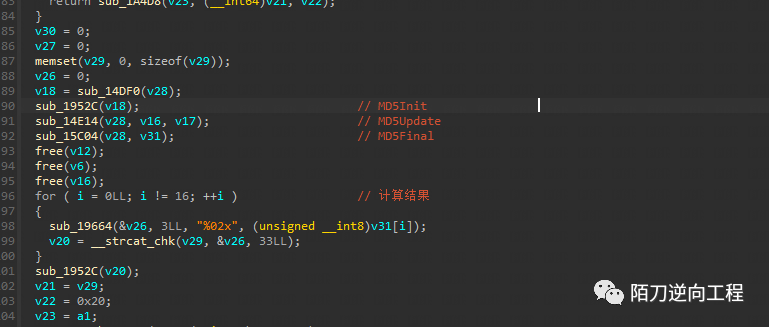
进去sub_14E14看一下有没有改啥
这里有一个小操作,可以用invert sign看一下补码
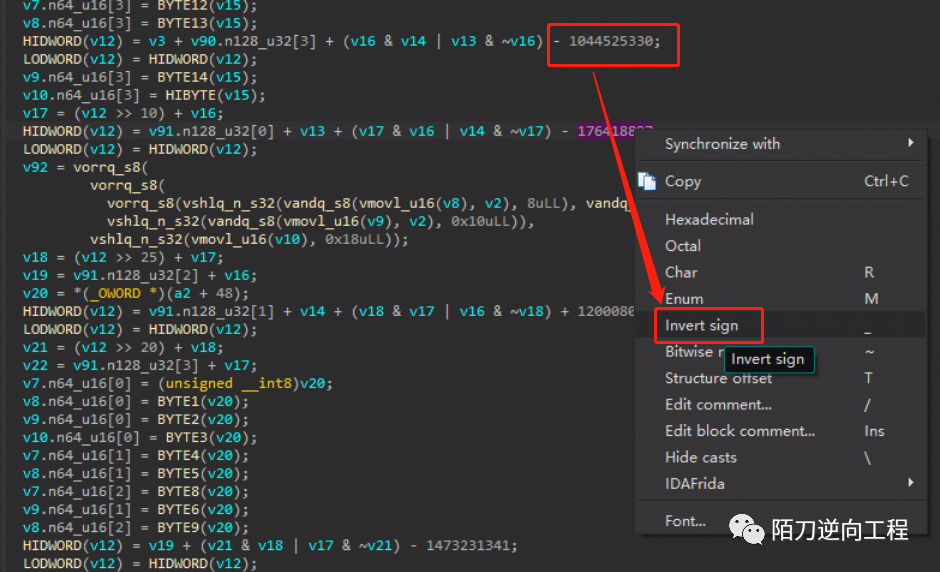
于是结果都正常了
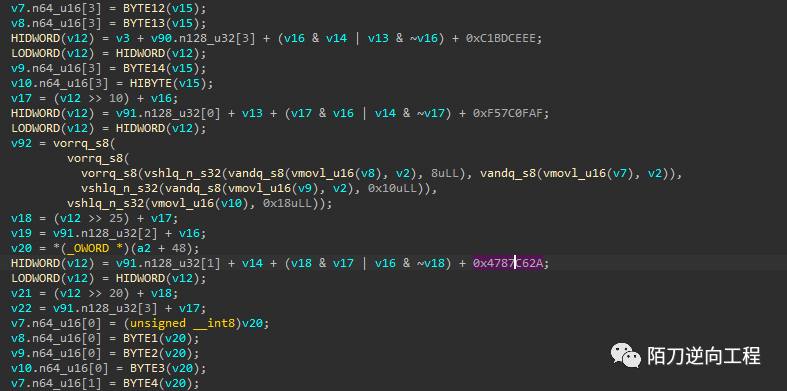
再来看一下sub_14DF0

32位的数据,从高位读到地位,也是没有变化的
于是计算一下结果,结果好像对不上

对这几个函数hook一下就会发现问题所在
v18 = sub_14DF0(v28); // MD5Initsub_1952C(v18);sub_14E14(v28, v16, v17); // MD5Updatesub_15C04(v28, v31); // MD5Final
处理后结果就正确了
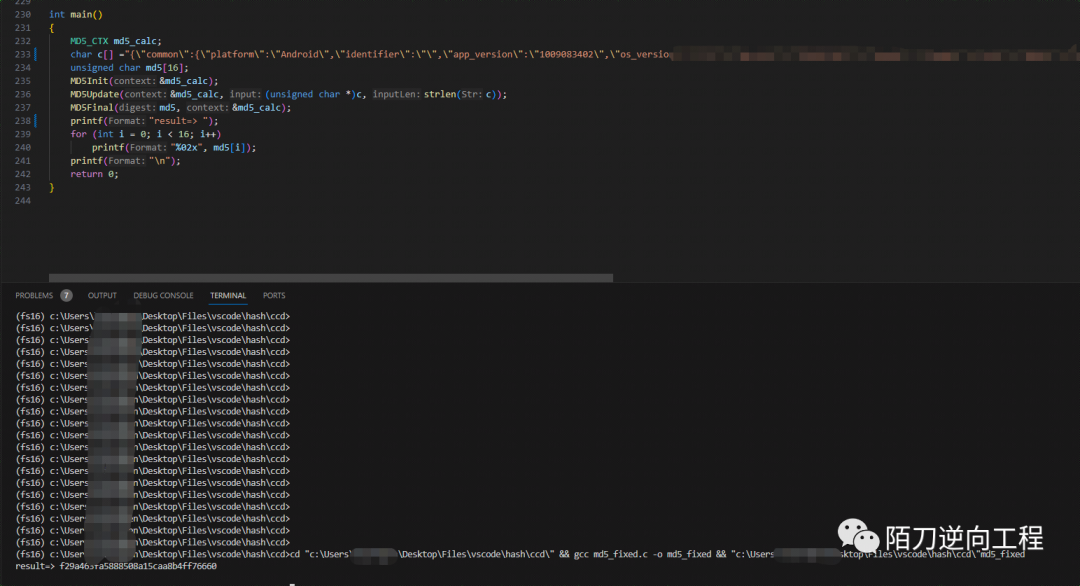
3.一篇图文并茂的IDA指南
https://bbs.kanxue.com/thread-266021.htm





















 2万+
2万+











 被折叠的 条评论
为什么被折叠?
被折叠的 条评论
为什么被折叠?








